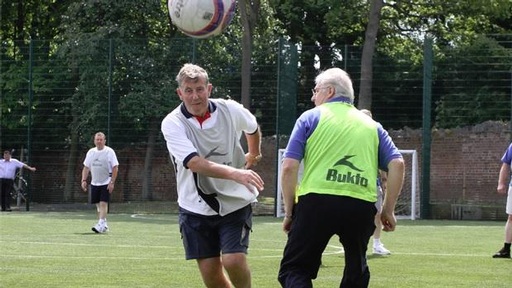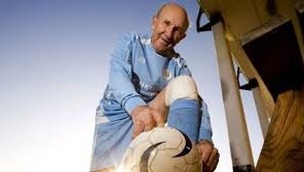Walking football allows people to play competitive football regardless of age or disability
Adapted sports such as walking football and chair based exercises have grown in popularity over recent years. As well as benefiting older people, these sports are often open to people of all ages and abilities to provide a way to mix with others and play a sport in an accessible way.

Walking football was launched in 2012 with the aim of providing older people with a version of the popular sport which allows them to enjoy playing competitive football regardless of age or disability.
Walking football sees referees penalising runners and demands players to show discipline and control.
The game remains the same as an original game of football in most ways, however players are required to walk with the ball and are forced to keep at least one foot on the ground at all times.
Experts have suggested older players operate better in smaller teams and on smaller pitches on a surface of Astroturf which causes less impact on knees and the lower body of older players.
Steve Rich launched and runs a walking football weekly session which has seen over 70 people try out walking football over the last eight months.
He said: “When the idea was proposed to me back in February, I jumped at the chance to get back into the game and immediately set about organising a session.
“There was no set age bracket as I felt the game should be open to anyone.”
Mr Rich encourages people of all ages to attend his matches and has regular players of both younger and older players. He said: “I at 54 do not mind mixing it up with the younger guys. They keep me fresh and active, and from my perspective they don't have much advantage over any 50+ participant that used to play the game - not at walking pace anyway.”
Players have reported greater general fitness levels and are increasingly finding the social aspect of the sessions are improving mental wellbeing through regular social interaction and a sense of belonging among teams.
 Ross Winters Hythe, player and advocate of Walking Football, said: “Steve is a great leader and there is a very friendly atmosphere in the group especially now we are getting to know each other better.
Ross Winters Hythe, player and advocate of Walking Football, said: “Steve is a great leader and there is a very friendly atmosphere in the group especially now we are getting to know each other better.
“On the health front, I am convinced that it is good for me. My blood pressure was on the borderline of acceptable before I started walking football but now it is perfectly ok so I won't be needing treatment at the moment.
“In general, it helps with fitness and generates a sense of vitality and alertness so I am hoping that it continues for years to come.”
Another player, Peter Candy, said: “I get great benefit from walking football, I was a more than handy central defender when I played 11 a side, and this gives me something to look forward to on a Thursday night. It is a very good group, with a good age range and is played very competitively and to a good standard.”
Player Eric Brooks said: “As I have discovered, walking football can be quite strenuous as walking fast stretches muscles and increases the range of mobility allowing for additional flexibility. Also skills needed on the pitch have to be fine-tuned to the pace of the game.
“Enjoyment, fun and competition are the main reasons most of the players turn up every week, and the knock on effect of this is, levels of increased fitness without even realising it.”
Extend Exercise
For those who do not find walking football appealing, there are many other sports providing regular activities which is accessible to people whatever level of fitness they have.
Extend Exercise run chair based exercise classes in communities throughout the country in places such as hospitals, sheltered housing, special needs clubs and village halls, reaching around 25,000 people.
Regular weekly chair based exercise sessions include 20 minutes of exercise, which is tailored and adaptable to suit the fitness and ability of each individual.
Bands, hoops, pompoms, parachutes and sticks are used as part of the exercise to increase the range of movements carried out to create interesting classes.
Extend participants have found their strength and stamina have improved and feelings of wellbeing they experience by spending time with other class members has improved their overall quality of life.
One active member said: “I joined Extend after a hip replacement operation and I also have arthritis in both knees. It helps to strengthen my muscles which improves my balance and gives me confidence when walking. Many members live alone so as well as benefiting from the exercise, meeting a group of like-minded people gives us social time and cheers everyone up.”
Another member said: “I had chair based exercises at the local hospital after a heart attack and they said to continue to exercising which is why I joined the local Extend class. It keeps me fit and I enjoy the company and meeting the other ladies.”
Another member explained learning and remembering set routines can improve cognitive ability to keep participants mentally alert. They said: ‘I come to Extend to enable me to live an independent life in old age.”
Carrying out these kinds of energetic movements whilst sat down has improved balance in older people, reducing the risk of falls in their everyday life.
Proud to be part of it
Players of walking football and organisers of chair exercises are keen to stress that sports created specifically for older people have not become less exciting or energetic because of this.
Reassuring people who might think walking football is a lesser version of the game, Mr Winters Hythe said: “The title could be a bit off-putting because it turns out that walking football is very energetic, quite fast and very much like normal indoor football.
“For me, at the age of 63, it is a very exciting way to become involved in football again.”
Peter Candy added: “Walking football appears to be a sport growing in popularity, and I am very proud to be a part of it.”
Latest Features News
 28-Nov-19
2019 Election: Labour pledges £10.8 bn for free personal care while Boris Johnson sidelines social care
28-Nov-19
2019 Election: Labour pledges £10.8 bn for free personal care while Boris Johnson sidelines social care
 18-Oct-19
Podcast: Wendy Mitchell and dementia: 'My biggest fear is not knowing who my daughters are'
18-Oct-19
Podcast: Wendy Mitchell and dementia: 'My biggest fear is not knowing who my daughters are'
 30-Sep-19
World's oldest diver aged 96 says 'never accept the fact you are getting old'
30-Sep-19
World's oldest diver aged 96 says 'never accept the fact you are getting old'
 27-Sep-19
Exclusive: Care minister backs care workers' call for time off to grieve and attend funerals
27-Sep-19
Exclusive: Care minister backs care workers' call for time off to grieve and attend funerals
 20-Sep-19
Podcast: Gyles Brandreth urges care workers to learn poetry with elderly
20-Sep-19
Podcast: Gyles Brandreth urges care workers to learn poetry with elderly